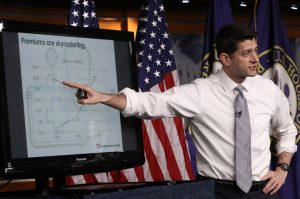 The House GOP’s American Health Care Act is being pushed quickly through the legislative process, with a vote on the House floor scheduled for as early as Thursday. The Republican legislation seeks to pay for the cost of repealing highly progressive taxes enacted as part of the Affordable Care Act by making substantial cuts to Medicaid funding and tax credits used to subsidize the purchase of health insurance by middle- and low-income households.
The House GOP’s American Health Care Act is being pushed quickly through the legislative process, with a vote on the House floor scheduled for as early as Thursday. The Republican legislation seeks to pay for the cost of repealing highly progressive taxes enacted as part of the Affordable Care Act by making substantial cuts to Medicaid funding and tax credits used to subsidize the purchase of health insurance by middle- and low-income households.
The two biggest tax cuts in the package are its repeal of the Additional Medicare Tax and the Net Investment Income Tax, which increased taxes on investment and wage income for individuals making over $200,000. Together, these provisions represent a $275 billion tax cut for the country’s richest taxpayers over the next ten years. According to a new analysis from the Institute on Taxation and Economic Policy (ITEP), the repeal of just these two provisions would provide the top 1 percent of taxpayers an average annual tax break of $19,672 nationwide.
The egregious inequity of these tax cuts look even worse when you compare them on a state-by-state level with the cuts to the premium tax credits that help low- and middle-income families afford health insurance. The new ITEP analysis gives a state-by-state breakdown of how many taxpayers will be impacted, the percentage of taxpayers impact, the total tax cuts, average tax cut for the top 1 percent, and the percent of tax cuts going to the top one percent. For example, the Center on Budget and Policy Priorities (CBPP) finds that in North Carolina the average premium tax credit would be cut by $5,360 resulting in an equivalent hike in health insurance costs, while ITEP’s data show that the top 1 percent of taxpayers in the state would see an average tax cut of $11,540 from just the repeal of these two Medicare tax increases. Similarly, the tax cuts for the rich are larger in many states than those states are losing in funding for Medicaid. For example, in Colorado federal Medicaid funding would fall by $340 million, while the ITEP analysis finds that the richest taxpayers in the state will see a federal tax cut of $544 million.
The overall impact of the legislation would be devastating. The latest analysis from the non-partisan Congressional Budget Office (CBO) finds that by 2018 as many as 14 million more people would be uninsured under the legislation, and that by 2026 as many as 24 million more people would not have health insurance. The bill would reverse most of the progress in health insurance coverage achieved by the Affordable Care Act. Building on this, the bill, with its nearly $900 billion in tax cuts, will also help pave the way for tax reform legislation by substantially lowering the baseline needed for future legislation to achieve revenue- and distributional-neutrality.
While the legislative process is moving fast, it is still unclear if the legislation has enough votes to pass. In the House, the bill is facing opposition from moderate Republicans, who are concerned about the benefit cuts, and many conservative Republicans, who want a more complete repeal of the Affordable Care Act provisions. There is every indication that the legislation will face total opposition from Democrats, which means that the Republican leadership can only lose 23 Republican votes in the House. The legislation is also likely to face more opposition in the Senate, with many Republican senators expressing concerns about the benefit cuts and a much narrower working margin. The Senate leadership can only afford to lose two Republicans and still pass the legislation.
To help win over moderate and conservative Republicans, the House leadership released a potential manager’s amendment that seeks to mollify opposition on both sides. The proposed changes are modest and are unlikely to significantly affect the harsh overall impact of the bill on health insurance coverage.




